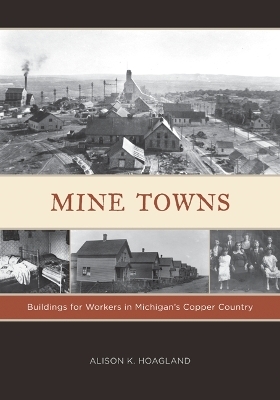
Mine Towns
Buildings for Workers in Michigan’s Copper Country
Seiten
2010
University of Minnesota Press (Verlag)
978-0-8166-6566-2 (ISBN)
University of Minnesota Press (Verlag)
978-0-8166-6566-2 (ISBN)
- Titel z.Zt. nicht lieferbar
- Versandkostenfrei innerhalb Deutschlands
- Auch auf Rechnung
- Verfügbarkeit in der Filiale vor Ort prüfen
- Artikel merken
During the nineteenth century, the Keweenaw Peninsula of Northern Michigan was the site of America’s first mineral land rush as companies hastened to profit from the region’s vast copper deposits. In order to lure workers to such a remote location—and work long hours in dangerous conditions—companies offered not just competitive wages but also helped provide the very infrastructure of town life in the form of affordable housing, schools, health-care facilities, and churches. The first working-class history of domestic life in Copper Country company towns during the boom years of 1890 to 1918, Alison K. Hoagland’s Mine Towns investigates how the architecture of a company town revealed the paternal relationship that existed between company managers and workers—a relationship that both parties turned to their own advantage. The story of Joseph and Antonia Putrich, immigrants from Croatia, punctuates and illustrates the realities of life in a booming company town. While company managers provided housing as a way to develop and control a stable workforce, workers often rejected this domestic ideal and used homes as an economic resource, taking in boarders to help generate further income. Focusing on how the exchange between company managers and a largely immigrant workforce took the form of negotiation rather than a top-down system, Hoagland examines surviving buildings and uses Copper Country’s built environment to map this remarkable connection between a company and its workers at the height of Michigan’s largest land rush.
Alison K. Hoagland is professor of history and historic preservation at Michigan Technological University and the author of Buildings of Alaska and Army Architecture in the West: Forts Laramie, Bridger, and D. A. Russell, 1849–1912.
Acknowledgments, Introduction: Negotiating Paternalism in the Copper Country, 1. Saltboxes and T-Plans: Creating and Inhabiting the Company House, 2. The Spaces of a Strike: Company Buildings and Landscapes in a Time of Conflict, 3. “Home for the Working Man”: Strategies for Homeownership, 4. Acquiring Conveniences: Water, Heat, and Light, 5. Churches, Schools, Bathhouses: Building Community on Company Land, 6. Preservation and Loss: Remembering Through Buildings, Notes, Bibliography, Index
| Erscheint lt. Verlag | 20.4.2010 |
|---|---|
| Verlagsort | Minnesota |
| Sprache | englisch |
| Maße | 178 x 254 mm |
| Themenwelt | Sachbuch/Ratgeber ► Geschichte / Politik ► Regional- / Landesgeschichte |
| Geisteswissenschaften ► Geschichte ► Regional- / Ländergeschichte | |
| Technik ► Architektur | |
| Technik ► Bergbau | |
| ISBN-10 | 0-8166-6566-4 / 0816665664 |
| ISBN-13 | 978-0-8166-6566-2 / 9780816665662 |
| Zustand | Neuware |
| Haben Sie eine Frage zum Produkt? |
Mehr entdecken
aus dem Bereich
aus dem Bereich
Russen und Ukrainer vom Mittelalter bis zur Gegenwart
Buch | Softcover (2023)
C.H.Beck (Verlag)
18,00 €
von der Staatsgründung bis zur Gegenwart
Buch | Softcover (2023)
C.H.Beck (Verlag)
12,00 €


